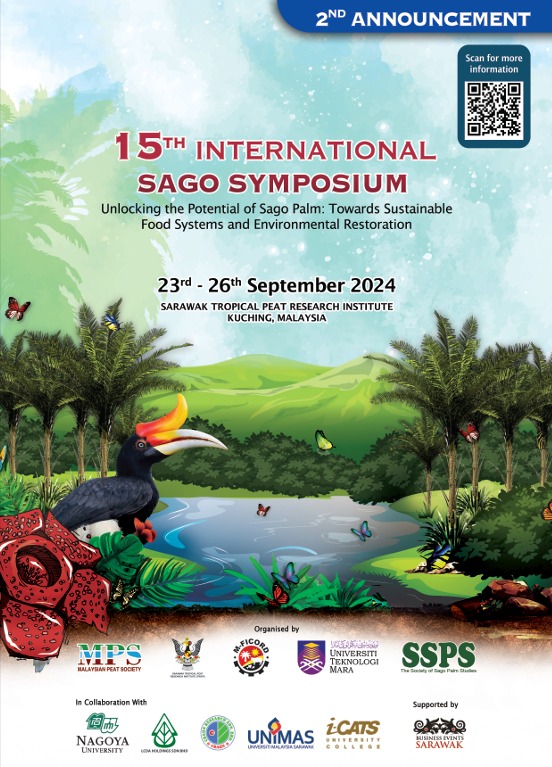
Kota Samarahan, 25 June 2024 – The 15th International Sago Symposium is set to take place from September 23-26, 2024, in Kuching, Sarawak, Malaysia. Organized by the Society of Sago Palm Studies, this symposium aims to explore the untapped potential of the sago palm in addressing global challenges related to food security, economic resilience, and ecological sustainability. The symposium will bring together experts, practitioners, and enthusiasts from around the world to discuss the agricultural, nutritional, and environmental aspects of sago palm and peatland restoration.
The symposium will feature in-depth sessions, presentations, and interactive workshops on innovative cultivation techniques, processing technologies, market strategies, and peatland restoration.
Policy discussions will also be a key component, focusing on sustainable practices and strategic development. The symposium aims to elevate global recognition of the benefits of sago palm, strengthen international cooperation, increase policy support and investment, and promote knowledge sharing and capacity building.
Important dates for the symposium include the closure of abstract submissions on May 30, 2024, notification of acceptance on June 15, 2024, and the submission of camera-ready papers on August 15, 2024. Early-bird registration ends on June 30, 2024. Registration fees vary based on category and timing, with special rates for international participants and students. The symposium also offers student grants to waive registration fees for eligible students.
The symposium provides a valuable opportunity for researchers, professionals, and stakeholders to contribute to the advancement of sago research, network with peers, and form collaborations. It aims to shape future policies and investments in sago palm cultivation, with a particular focus on its role in tropical peatland restoration.
The organizing committee, led by Datu Dr. Lulie Melling, Director of the Sarawak Tropical Peat Research Institute, is working diligently to ensure the success of the symposium. The scientific committee, chaired by Margaret Chan Kit Yok, Associate Professor at Universiti Teknologi Mara, will oversee the selection of abstracts and the organization of the technical program.
The 15th International Sago Symposium has a diverse group of 11 organizers involved in its planning and execution. These organizers come from various institutions and organizations, each bringing their expertise and contributions to the symposium. Here is a breakdown of the 11 organizers:
- Sarawak Tropical Peat Research Institute (STPRI): STPRI is the organizing chair of the symposium. Led by Datu Dr. Lulie Melling, STPRI plays a central role in coordinating the event and ensuring its success. STPRI is dedicated to research and development related to tropical peatlands and their sustainable utilization.
- Ministry of Food Industry, Commodity & Regional Development Sarawak: This ministry is part of the Sarawak State Government and is involved in the secretariat of the symposium. Their role includes providing support and assistance in organizing the event.
- Universiti Teknologi Mara (UiTM): UiTM is one of the largest public universities in Malaysia and is known for its focus on technical and professional education. As a joint organizer, UiTM contributes its expertise in research, education, and industry collaboration to the symposium.
- LCDA Agri Business Sdn Bhd: LCDA Agri Business is a company involved in the development of agribusiness in Sarawak, Malaysia. Their participation as an organizer likely includes providing industry insights and expertise related to sago palm cultivation and utilization.
- Visayas State University: Visayas State University is a leading educational institution in the Philippines. Their involvement as an organizer signifies their commitment to promoting sago palm’s potential in food and industry, particularly in the Visayas region.
- Food and Agriculture Organization of the United Nations (FAO): FAO is an international organization that works towards achieving food security and sustainable agriculture. Their participation as an advisory committee member highlights their support for the symposium’s objectives and their expertise in agricultural development.
- Association for the Promotion of Self-reliance in Asia: This organization, led by Hiroyuki Konuma, is dedicated to promoting self-reliance and sustainable development in Asia. Their involvement as an advisory committee member demonstrates their commitment to supporting initiatives related to sago palm and its potential.
- International Center for Research and Education in Agriculture, Nagoya University: Led by Hiroshi Ehara, this center is part of Nagoya University in Japan. Their participation as an international committee member signifies their expertise in sago palm studies and their commitment to advancing research and education in agriculture.
- IPB University: IPB University, also known as Bogor Agricultural University, is a prestigious institution in Indonesia. Their involvement as an international committee member showcases their expertise in sago palm research and their dedication to promoting sustainable agriculture.
- Kasetseart University: Kasetseart University is a leading agricultural university in Thailand. Their participation as an international committee member highlights their commitment to advancing knowledge and research in the field of sago palm.
- Kuala Belalong Field Studies Centre, Universiti Brunei Darussalam: This research center, located in Brunei, focuses on environmental studies and biodiversity conservation. Their involvement as an international committee member reflects their interest in sago palm’s potential for ecological restoration and sustainable development.
These 11 organizers, with their diverse backgrounds and expertise, contribute to the symposium’s success by providing guidance, support, and valuable insights into various aspects of sago palm cultivation, utilization, and research.
Overall, the 15th International Sago Symposium promises to be a stimulating and productive event, contributing to the global movement towards sustainability and restoration using the sago palm as a key component. Interested individuals are encouraged to register now and visit the official website for more information.
